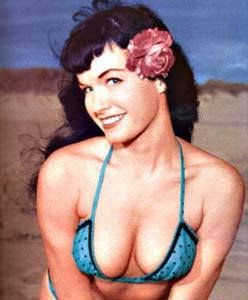According to PLAYBOY magazine, Bettie Page is "the Queen of Pin-ups. the model of the century, yet she remains one of its best kept secrets."

Mention her name to most, you get blank stares. Mention her name to some, you get a knowing look that rocks the room! As more and more people are learning, Bettie Page is a timeless legend, and also a conundrum, even to herself.
For those who understand who Bettie Page was, no explanation is necessary; for those who don't, maybe no explanation is possible. Why? Because Bettie Page was and remains an underground phenomenon, a puzzling "bad girl next door" cult figure - sort of our collective guilty pleasure.
Since she was PLAYBOY'S Miss January of 1955, one might think her time has come and gone. Not so. Bettiemania is huge and growing. Fashion designers copy her. More and more supermodels are inspired by her style and heart-breaking great looks. How many hundred Bettie Page Web pages are there, out there? Since August 9, 2000 this site alone has tabulated 626 million hits. Fans can't get enough of her. Fans want her. And fans find her.

Naughty and nice, pinup extraordinaire Bettie Page was hot, is hot, and likely will remain so in perpetuity. That's who she is, too.
If they made a movie of her enigmatic life - and someone just has - few would believe it. Bettie Page grew up, poor, in Nashville, Tennessee. Her mother didn't want her. Her father molested her. She was an exceptional student. She was raised in the Church.
The girl with the trademarked black bangs, fabulous killer curves, and sweet smile, grew up loving movies, and dreamed of a film career. She should have been the next Marilyn Monroe. But her story is an impossible incursion of near misses, bad luck and lost opportunities. Full of contradictions, some have called her "The Dark Angel," for good reason, and for more reasons than one. Sometimes Bettie Page's puzzling persona both attracts us and repels us at the same time.

In New York she drifted innocently into modeling, posing for camera clubs. That beautiful smile "suggested forbidden fruit as well as apple pie," said PLAYBOY. The charm, the appeal, the danger, the allure of those sensational photos is beyond what words can convey.
Without imagining the consequences on any conscious level, Bettie found that her provocative cheesecake photographs during the period of 1950 through 1957 violated all manner of sexual taboos and finally invoked a United States Senate Committee investigation.
Bettie Page never gave interviews, not even when her silent photos were ubiquitous. And then this pin-ultimate pin-up was gone -- vanished from view. Like Garbo, like James Dean, like Jean Harlow. It was a mystery. Had she died? Was she hiding? No one knew. Fantastic rumors abounded. Nearly four decades passed.

Eleven years ago the truth was revealed. While battling some fierce inner demons, the legendary Bettie Page had quietly, secretly fled New York and given her life to Jesus Christ. And incredible as it may seem, as yet another riddle in her complicated life, all this time Bettie Page was completely oblivious of her own profound impact upon America's sexuality and pop culture, not to mention the thriving industry that had arisen around her celebrated image.

Two examples: Dave Stevens created a comic book hero called "The Rocketeer," with a love interest clearly inspired by Bettie Page; Disney adapted it as a vehicle for Oscar-winning actress Jennifer Connelly. And the noted artist Olivia, who has been painting Bettie for a quarter century, was the first to successfully integrate her fetish imagery for a high fashion licensee, Fiorucci Jeans.

Through the years, to protect the privacy she craved, when people would recognize her and ask if she was Bettie Page, she'd answer, "Who's that?"
Who, indeed. Complex, contradictory, extremely intelligent, exquisitely pretty, naughty or nice, not even Bettie Page herself can tell us who she is, exactly how she got that way, and what it all means. She's one pin-up no one can pin down, although the mystery fails to deter millions of us -- and millions to come -- from trying.
Hugh Hefner says Bettie's appearance in PLAYBOY was a milestone, and that "she became, in time, an American icon, her winning smile and effervescent personality apparent in every pose. A kinky connection was added by Irving Klaw's spanking, fetish and bondage photos, which became part of the Bettie Page mystique; they were playful parodies that are now perceived as the early inspiration for Madonna's excursions into the realm of sexual perversion."
Despite having worked with but a single competent photographer, despite having thousands of her photographs destroyed on purpose following the congressional hearings, and despite so many extant photos surviving only as inferior copies of the originals, the transcendent beauty and playful yet dangerous personality of Bettie Page trumps all else and continues to inspire documentary films, designers' fashions, artists' fetishes, and fans' fantasies.




















